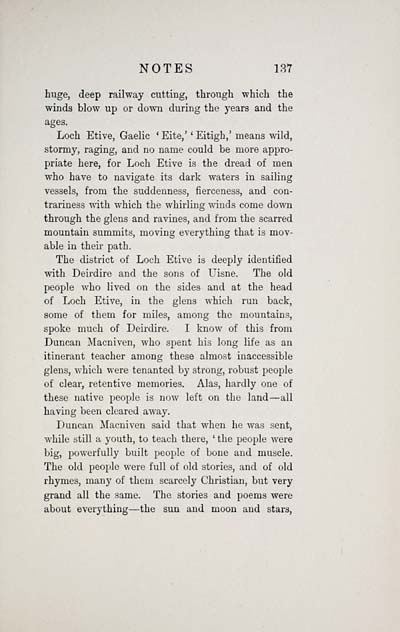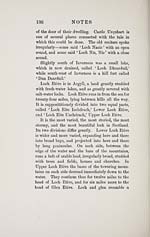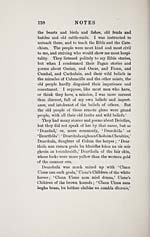Download files
Complete book:
Individual page:
Thumbnail gallery: Grid view | List view

NOTES 137
huge, deep railway cutting, through which the
winds blow up or dowii during the years and the
ages.
Loch Etive, Gaelic ' Eite/ ' Eitigb,' means wild,
stormy, raging, and no name could be more appro-
priate here, for Loch Etive is the dread of men
who have to navigate its dark waters in sailing
vessels, from the suddenness, fierceness, and con-
trariness with which the whirling -n-inds come down
through the glens and ravines, and from the scarred
mountain summits, moving everything that is mov-
able in their path.
The district of Loch Etive is deeply identified
with Deirdire and the sons of L^isne. The old
people who lived on the sides and at the head
of Loch Etive, in the glens which run back,
some of them for miles, among the mountains,
spoke much of Deirdire. I know of this from
Duncan Macniven, who spent his long life as an
itinerant teacher among these almost inaccessible
glens, which were tenanted by strong, robust people
of clear, retentive memories. Alas, hardly one of
these native people is now left on the land — all
having been cleared away.
Duncan Macniven said that when he was sent,
while still a youth, to teach there, ' the people were
big, powerfully built people of bone and muscle.
The old people were full of old stories, and of old
rhymes, many of them scarcely Christian, but very
grand all the same. The stories and poems were
about everything — the sun and moon and stars,
huge, deep railway cutting, through which the
winds blow up or dowii during the years and the
ages.
Loch Etive, Gaelic ' Eite/ ' Eitigb,' means wild,
stormy, raging, and no name could be more appro-
priate here, for Loch Etive is the dread of men
who have to navigate its dark waters in sailing
vessels, from the suddenness, fierceness, and con-
trariness with which the whirling -n-inds come down
through the glens and ravines, and from the scarred
mountain summits, moving everything that is mov-
able in their path.
The district of Loch Etive is deeply identified
with Deirdire and the sons of L^isne. The old
people who lived on the sides and at the head
of Loch Etive, in the glens which run back,
some of them for miles, among the mountains,
spoke much of Deirdire. I know of this from
Duncan Macniven, who spent his long life as an
itinerant teacher among these almost inaccessible
glens, which were tenanted by strong, robust people
of clear, retentive memories. Alas, hardly one of
these native people is now left on the land — all
having been cleared away.
Duncan Macniven said that when he was sent,
while still a youth, to teach there, ' the people were
big, powerfully built people of bone and muscle.
The old people were full of old stories, and of old
rhymes, many of them scarcely Christian, but very
grand all the same. The stories and poems were
about everything — the sun and moon and stars,
Set display mode to: Large image | Transcription
Images and transcriptions on this page, including medium image downloads, may be used under the Creative Commons Attribution 4.0 International Licence unless otherwise stated. ![]()
| Early Gaelic Book Collections > Matheson Collection > Deirdire; and, The lay of the children of Uisne > (151) |
|---|
| Permanent URL | https://digital.nls.uk/76572119 |
|---|
| Description | Items from a collection of 170 volumes relating to Gaelic matters. Mainly philological works in the Celtic and some non-Celtic languages. Some books extensively annotated by Angus Matheson, the first Professor of Celtic at Glasgow University. |
|---|
| Description | Selected items from five 'Special and Named Printed Collections'. Includes books in Gaelic and other Celtic languages, works about the Gaels, their languages, literature, culture and history. |
|---|

